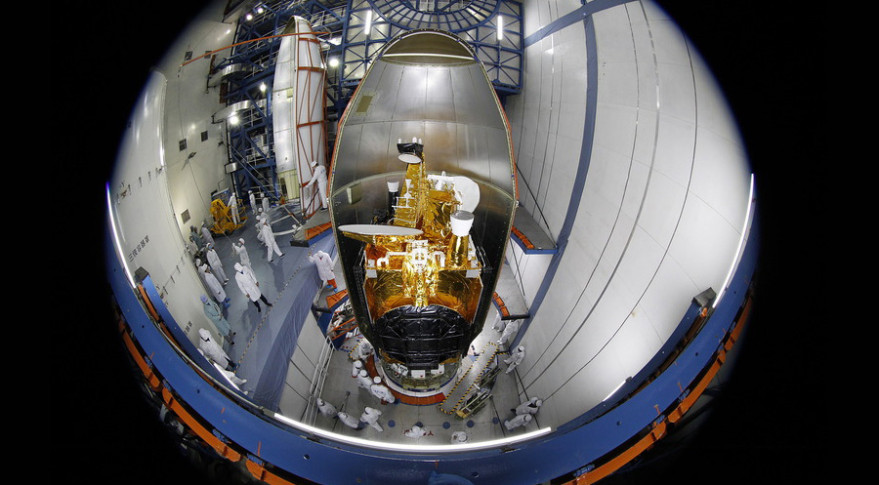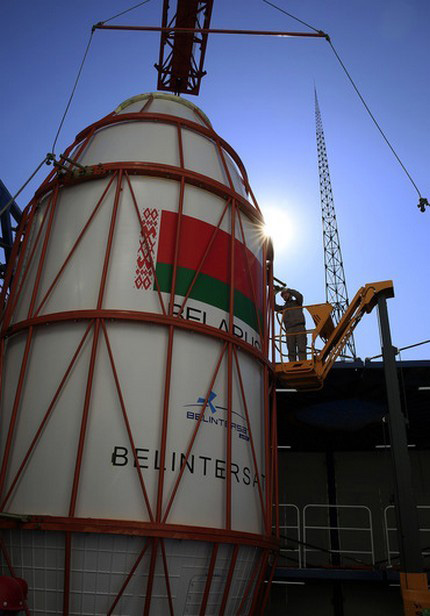First Belarusian Satellite Has A Mission of Profit, Not Prestige

Breaking space news, the latest updates on rocket launches, skywatching events and more!
You are now subscribed
Your newsletter sign-up was successful
Want to add more newsletters?

Delivered daily
Daily Newsletter
Breaking space news, the latest updates on rocket launches, skywatching events and more!

Once a month
Watch This Space
Sign up to our monthly entertainment newsletter to keep up with all our coverage of the latest sci-fi and space movies, tv shows, games and books.

Once a week
Night Sky This Week
Discover this week's must-see night sky events, moon phases, and stunning astrophotos. Sign up for our skywatching newsletter and explore the universe with us!

Twice a month
Strange New Words
Space.com's Sci-Fi Reader's Club. Read a sci-fi short story every month and join a virtual community of fellow science fiction fans!
PARIS — The Jan. 15 launch of Belarus's first satellite, Belintersat-1, aboard a Chinese rocket illustrates the new thinking among start-up government satellite owners, who view export revenue as more important than having a national flag in orbit.
Belintersat, the company created to market Belintersat-1 in Africa, Asia and Europe, said it has already sold half the available capacity to Chinese customers and would be seeking partnerships with established satellite operators, especially in the African market, to sell the rest.
In statements leading up to the launch, and in submissions to the International Telecommunication Union, which regulates orbital positions and broadcast frequencies, Belarusian authorities outlined the occasionally complicated negotiations they were forced to undertake to avoid interference with existing nearby satellites.
Belintersat-1, placed into orbit aboard a Chinese Long March 3B rocket operating from China's Xichang Satellite Launch Center in southwest China's Xichuan Province, is designed to operate for 15 years from 51.5 degrees east.
It is a crowded neighborhood, with multiple satellites owned by Russian and Chinese operators, among others, operating less than two degrees away on the geostationary arc.
Belintersat-1 carries 20 C-band transponders and the equivalent of 18 Ku-band transponders.
The Belarusian government purchased the satellite, along with launch services, an insurance package covering the launch plus the first year in orbit, and nine months of satellite operations training for Belarusian engineers in China, for $280.9 million. The August 2012 contract, which followed what Belarus officials said was an international tender, has been financed by a 15-year loan from the Export-Import Bank of China.
Breaking space news, the latest updates on rocket launches, skywatching events and more!
The government has reserved two of the Ku-band transponders for its own use. Eight other transponders — seven in C-band, one in Ku-band — have been leased to Chinese customers.
In a statement, Belintersat said it should be viewed as a commercial entity with ambitions to build another satellite and to become a long-term player in the occasionally rough African and Asian markets. Both these markets have seen satellite bandwidth prices fall in recent months with overcapacity.
"While the Republic of Belarus has invested heavily in Belintersat, it created the project to function as a commercial entity," Belintersat said. "The project gained direct state support because of the highly evident commercial applications and export potential it had.
"The main advantage of this project is the generation of profit in the course of the satellite capacity commercialization."
The proliferation of new, national telecommunications satellite operators, most with only one satellite, shows no sign of easing. But while some operators, such as those in Laos, Venezuela and Nigeria — all of which purchased Chinese-built, Chinese-launched satellites with Chinese financing — have yet to demonstrate a clear commercial focus, others have made revenue generation a key goal.
Nations entering the field with stated commercial ambitions in the past couple of years include Qatar, Turkmenistan/Monaco and Azerbaijan. This recent crop of satellite operators presents a more serious challenge to the established global fleet owners, who are already struggling to show revenue growth.
In a move that may signal how Belintersat intends to position itself in Africa, the company selected Nigcomsat of Nigeria as a Belintersat-1 satellite operations partner. It is the first such business Nigcomsat has won.
Belintersat said it has contracted with iDirect of Herndon, Virginia, and Gilat Satellite Networks of Petah Tikva, Israel — both well established in the market — to provide the Belintersat-1 ground network.
The China Aerospace Science and Technology Corp. is managing Belintersat-1 in-orbit checkout and is scheduled to hand over operations to Belintersat by April 1, at which point the satellite will enter commercial service.
"After Belintersat-1, the organization hopes to build out a constellation of satellites leveraging international partnerships to become a force in the global market," Belintersat said.
This story was provided by SpaceNews, dedicated to covering all aspects of the space industry.
Peter B. de Selding is the co-founder and chief editor of SpaceIntelReport.com, a website dedicated to the latest space industry news and developments that launched in 2017. Prior to founding SpaceIntelReport, Peter spent 26 years as the Paris bureau chief for SpaceNews, an industry publication. At SpaceNews, Peter covered the commercial satellite, launch and international space market. He continues that work at SpaceIntelReport. You can follow Peter's latest project on Twitter at @pbdes.



